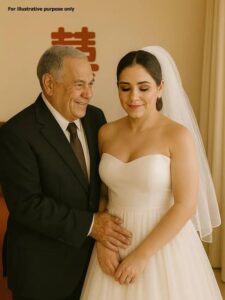Part2: A 70-year-old man marries a 20-year-old girl as his second wife to have a son, but on their wedding night, a sh0cking incident occurs…

Marisol’s days after the funeral were filled with silence and judgment. The entire town seemed to have their eyes fixed on her, whispering whenever she walked past the plaza. Some pitied her, saying she was too young to carry such a burden. Others sneered, claiming she had only married Don Tomás for money and had brought him bad luck.

She lived for a while in the hacienda, surrounded by the wealth of the man she had never learned to love. Don Tomás’s three daughters, bitter and suspicious, treated her coldly. They accused her of being a fortune-hunter, insisting she had bewitched their father. “You stole our inheritance,” one of them hissed during a heated argument. Marisol kept her head down, swallowing the insults, aware that without Don Tomás’s name, she was nothing more than a poor girl from the outskirts of town.
Yet life inside the hacienda was unbearable. Servants avoided her, family members ignored her, and her nights were sleepless, filled with memories of that single evening that had sealed her fate. Finally, one dawn, she packed a small bag and returned to her parents’ humble home.
Her family welcomed her with relief. Thanks to Don Tomás’s dowry, her brother was recovering from his illness. Her father hugged her tightly, murmuring, “You saved us, hija, even if it cost you everything.” Those words were meant to comfort her, but they cut deeper than she expected. Was her sacrifice truly worth it?
Months passed, and Marisol began to rebuild her life. She worked in the market, selling herbs and handmade embroidery. She was quiet, reserved, and carried herself with a dignity that made others look at her differently. But the label of “the widow” never left her. Suitors avoided her, and older women whispered that she carried a curse.
One afternoon, while gathering herbs near the river, Marisol encountered Sebastián, a young teacher recently arrived in town. Unlike the others, he did not stare at her with suspicion but spoke kindly, asking about the plants she carried. Their conversations grew frequent, and for the first time, Marisol felt the warmth of companionship without the shadow of obligation.
But word of her friendship with Sebastián spread quickly. The daughters of Don Tomás, still resentful, accused her of dishonoring their father’s memory. “Barely a year a widow, and already seeking another man,” they spat publicly. The townspeople murmured again, dividing between those who condemned her and those who believed she had the right to rebuild her life.
Marisol wrestled with guilt and longing. She had promised herself to endure her fate quietly, but deep inside, a flame of hope stirred—hope for a future not defined by tragedy, but by her own choices.
Standing before her mother one evening, she whispered, “I was sold once, mamá. But if I ever marry again, it will be for love, not duty.”
Her words marked a turning point. For the first time since that cursed wedding night, Marisol felt she might reclaim her life, even if it meant defying the weight of tradition and the scorn of an entire town.